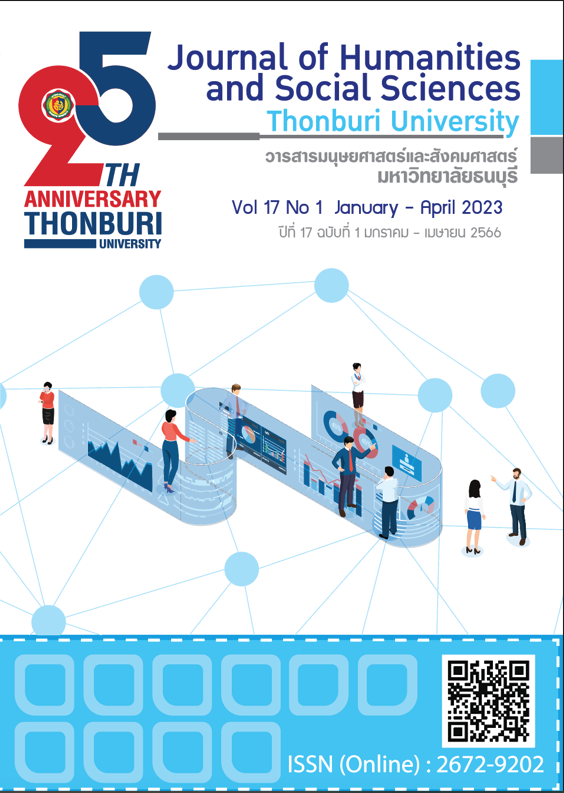ภาษีเงินได้บุคคลธรรมดาในประเทศไทย: ปัญหาที่ถูกซ่อนอยู่
คำสำคัญ:
ภาษีเงินได้บุคคลธรรมดา, การหลีกเลี่ยงภาษี, การหนีภาษี, ผู้จ่ายภาษีบทคัดย่อ
งานวิจัยนี้มีวัตถุประสงค์เพื่อตรวจสอบปัญหาของการคำนวณและการจ่ายภาษีเงินได้บุคคลธรรมดาในประเทศไทยซึ่งมีผลกระทบกับการหลีกเลี่ยงภาษีและการหนีภาษี นอกจากนี้งานวิจัยได้หาแนวทางสำหรับการเพิ่มประสิทธิภาพของภาษีเงินได้บุคคลธรรมดาในประเทศไทย แบบสอบถามออนไลน์จำนวน 4,804 ฉบับได้ถูกส่งไปยังผู้จ่ายภาษีและได้รับการตอบกลับแบบสอบถามที่สมบูรณ์จำนวน 3,384 ฉบับได้ถูกใช้ในการวิเคราะห์การวิเคราะห์ความถดถอยโลจิสติกได้ถูกใช้ในการศึกษาความสัมพันธ์ระหว่างปัญหาของการคำนวณและการจ่ายภาษีเงินได้บุคคลธรรมดาในประเทศไทยกับแนวโน้มในการหลีกเลี่ยงภาษีและการหนีภาษี ผลการศึกษาพบว่าความไม่ยุติธรรมในการจ่ายภาษีมีความสัมพันธ์เชิงบวกกับแนวโน้มในการหลีกเลี่ยงภาษีมากที่สุด รองลงมาคือปัญหาค่าลดหย่อนที่ ไม่ครอบคลุมกับรายจ่ายที่เกิดขึ้นจริงและความซับซ้อนในการคำนวณภาษี ในขณะที่ปัญหาที่เกี่ยวกับอัตราภาษีเงินได้บุคคลธรรมดามีความสัมพันธ์เชิงบวกกับแนวโน้มในการหนีภาษีมากที่สุด รองลงมาคือปัญหาการขาดความช่วยเหลือจากเจ้าหน้าที่สรรพากรและความไม่ยุติธรรมในการจ่ายภาษี เพื่อที่จะแก้ไขปัญหาเหล่านี้ กรมสรรพากรควรจะลดความซับซ้อนในการคำนวณภาษี เพิ่มค่าลดหย่อนให้เพียงพอกับรายจ่าย นอกจากนี้การลดอัตราภาษีเงินได้บุคคลธรรมดาและการปรับปรุงคุณภาพการบริการสามารถที่จะลดการหนีภาษีได้ ในท้ายที่สุดเพื่อที่จะลดปัญหาการหลีกเลี่ยงภาษีและการหนีภาษี ควรปรับแก้ไขความไม่ยุติธรรมในการจ่ายภาษี
เอกสารอ้างอิง
Adebisi, J., & Orsaa, D. (2013). Effect of Tax Avoidance and Tax Evasion on Personal Income Tax Administration in Nigeria. American Journal of Humanities and Social Sciences, 1(3), 125-134.
Allingham, M. G., & Sandmo, A. (1972). Income tax evasion: a theoretical analysis. Journal of Public Economics, 1(3-4), 323-338.
Alm, J. (2021). Tax Evasion, technology, and inequality. Economics of Governance, 22, 321-343.
Amina, A., & Saniya, K. (2015). Tax Compliance and Its Determinant the Case of Jimma Zone, Ethiopia. International Journal of Research In Social Sciences, 6(2), 7-21.
Awasthi, R., & Bayraktar, N. (2015). Can tax simplification help lower tax corruption? Eurasian Economic Review, 5, 297-330.
Bala, A., Enoch, E. Y., & Yakubu, S. (2018). The Problems of Personal Income Tax on Revenue Generation in GOMBE State. International Journal of Business and Management Invention, 7(7), 20-28.
Bethencourt, C.,& Kunze, L. (2015). The political economics of redistribution, inequality and tax avoidance. Public Choice, 163, 267-287.
Beza, M., & Debre, M. (2014). Determinants of taxpayers voluntary compliance with taxation in East Gojjam city, Ethiopia. Research Journal of Economic and Business Studies, 3(93), 41-50.
Brown, C. V. (1983). Taxation and the Incentive to Work. Oxford: Oxford University Press.
Budak, T., & James, S. (2018). The Level of Tax Complexity: A Comparative Analysis Between the UK and Turkey Based on the OTS Index. International Tax Journal, 27-40.
Chiumya, C. (2006, May 19). Counteracting Tax Evasion In Malawi: An Analysis Of The Methods And A Quest For Improvement. Retrieved 10 July 2022 from https://mpra.ub.uni-muenchen.de/9892/
Clotfelter, C. (1983). Tax Evasion and Tax Rates: An Analysis of Individual Returns. The Review of Economics and Statistics, 65(3), 363-373.
Davis, M., Cebula, R., & Boylan, R. (2021). A Further Inquiry into Factors that Influence Federal Personal Income Tax Evasion in the U.S. Applied Economics, 53(15), 1777-1787.
Gambo, E.-M. J., Mas'ud, A., Nasidi, M., & Oyewole, O. S. (2014). Tax Complexity and tax compliance in African self-assessment environment. International Journal of Management Research and Reviews, 4(5), 575-582.
GIZ Sector Programme Public Finance, Administrative Reform. (2010). Addressing tax evasion & tax avoidance in developing countries. Eschborn: Deutsche Gesellschaft fur Internationale Zusammenarbeit (GIZ) GmbH.
Hanlon, M., & Heitzman, S. (2010). A review of tax research. Journal of accounting Economics, 50(2-3), 127-178.
Hoppe, T. (2020). Tax complexity in Australia: A survey-based comparison to the OECD average. Australian Tax Forum, 35(4), 451 - 475.
Hoppe, T., Schanz, D., Sturm, S., & Sureth, C. (2019). Measuring tax complexity across countries: A survey study on MNCs. arqus Discussion Paper No. 245, 1-79.
IMF. (2011, March 8). Revenue Mobilization in Developing Countries. Retrieved 10 July 2022 from https://www.imf.org/external/np/pp/eng/2011/030811.pdf
Isa, K. M., Yussof, S. H., & Mohdali, R. (2014). The Role of Tax Agents in Sustaining the Malaysian Tax System. Procedia - Social and Behavioral Sciences, 164, 366-371.
Kasipillai, J., Aripin, N., & Amran, N. A. (2003). The Influence of Education on Tax Avoidance and Tax Evasion. eJournal of Tax Research, 1(2), 134 -146.
Kirchler, E., Muehlbacher, S., Kastlunger, B., & Wahl, I. (2007). Why Pay Taxes? A Review of Tax Compliance Decisions. International Studies Program Working Paper 07-30, 7-30.
Lang, O., Noehrbab, K.H. & Stahl, K. (1997). On income tax avoidance: The case of Germany. Journal of Public Economics, 66, 327-347.
Mannan, K. A., Farhana, K. M., & Chowdhury, G. F. (2020). Socio-economic Factors of Tax Compliance: An Empirical Study of Individual Taxpayers in the Dhaka Zones, Bangladesh. The Cost and Management, 48(6), 36-47.
Oladipupo, A. O., & Obazee, U. (2016). Tax Knowledge, Penalties and Tax Compliance in Small and Medium Scale Enterprises in Nigeria. iBusiness, 8(1), 1-9.
Popescu, L. (2020), Tax Evasion between Legality and Fraud, Annual of the Constantin Brancusi, Economy Series, 4, 48-53.
Revenue Department (2022). E-Tax Invoice & Receipt. Retrieved 13 April 2022 from https://etax.rd.go.th/etax_staticpage/app/#/index/main#top.
Roine, J. (2006). The political economics of not paying taxes. Public Choices, 126, 107-134.
Sapiei, N. S., & Kasipillai, J. (2013). Impacts of the Self-Assessment System for Corporate Taxpayers. American Journal of Economics, 3(2), 75-81.
Svetalekth, T. & Phonsumlissakul, K. (2022). Effects of Taxpayers Characteristics and Attitudes on Tax Avoidance and Tax Evasion: Evidence on Personal Income Tax in Thailand. Journal of Business Administration, 45 (175), 26-48.
Tanzi, V. (1980). Inflationary Expectations, Economic Activity, Taxes, and Interest Rates. American Economic Review, 70(1), 12-21.
Tongco, M. D. C. (2007). Purposive Sampling as a Tool for Informant Selection. Ethnobotany Research and Applications, 5, 147–158.
Torgler, B. (2003, July 11). Tax morale: theory and empirical analysis of tax compliance. Retrieved 8 May 2022, from http://edoc.unibas.ch/diss/DissB_6463
Virmani, A. (1987). Tax Evasion, Corruption and Administration: Monitoring the People's Agents Under Symmetric Dishonesty. Development Research Division discussion paper 271, World Bank.
Wärneryd, K.-E., & Walerud, B. (1982). Taxes and economic behavior: Some interview data on tax evasion in Sweden. Journal of Economic Psychology, 2(3), 187–211.
Witte, A. D., & Woodbury, D. F. (1983). What we know about the factors affecting compliance with the tax laws. In P. (Sawicki, Income tax compliance: a report of the ABA Section of Taxation Invitational Conference on Income Tax Compliance (pp. 133-148). Reston, VA.: Chicago, Ill.
Worlu, C. N., & Nkoro, E. (2012). Tax Revenue and Economic Development in Nigeria: A Macroeconometric Approach. Academic Journal of Interdisciplinary Studies, 1(2), 211-223.
Yamane, T. (1967). Statistics: An Introductory Analysis. 2nd ed. New York: Harper and Row.
ดาวน์โหลด
เผยแพร่แล้ว
รูปแบบการอ้างอิง
ฉบับ
ประเภทบทความ
สัญญาอนุญาต
ลิขสิทธิ์ (c) 2022 Thamrongsak Svetalekth, Kanjana Phonsumlissakul

อนุญาตภายใต้เงื่อนไข Creative Commons Attribution-NonCommercial-NoDerivatives 4.0 International License.
ผลงานที่ปรากฎในวารสารฉบับนี้เป็นลิขสิทธิ์เฉพาะส่วนบุคคลของผู้เขียนซึ่งต้องรับผิดชอบต่อผลทาง กฎหมายที่อาจเกิดขึ้นได้และไม่มีผลต่อกองบรรณาธิการ






